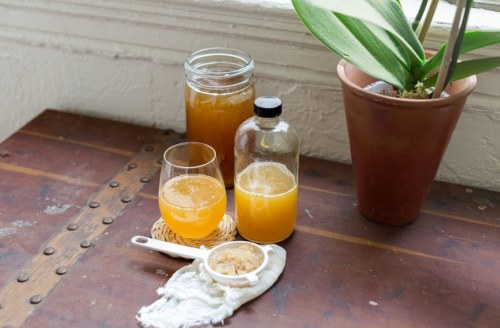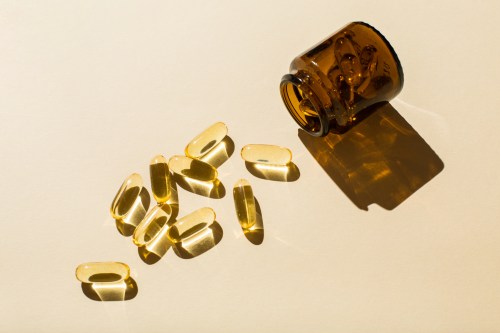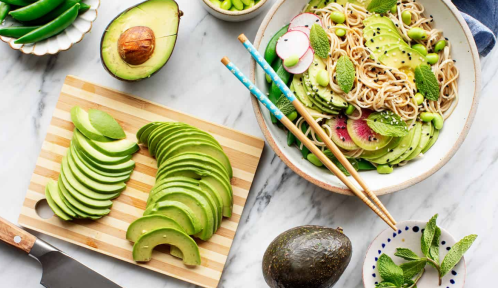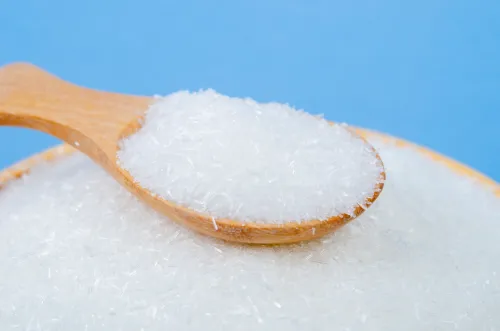Our editors independently select these products. Making a purchase through our links may earn Well+Good a commission
For the past several years, kombucha‘s had the probiotic beverage market on lock. But there’s a new fermented drink on the rise that just might give your old fave a run for its money. It’s called water kefir, and it’s even being hailed as—dare we say—the new ‘booch.
Chances are, you’re already familiar with “regular” kefir. “Traditionally, kefir is made from milk that is fermented, which means that it contains beneficial bacterial strains,” says functional nutritionist Brigid Titgemeier, MS, RDN, LD. (It looks and tastes like a drinkable yogurt, says Christy Brissette, RD, president of 80 Twenty Nutrition in Chicago.)
Water kefir, on the other hand, is a dairy-free, vegan alternative. Granted, the bacteria in milk kefir helps break down the lactose—so people who are lactose intolerant may still be able to have it, says Brissette. But it may still contain milk proteins like casein and whey, and some people are sensitive to those, adds Titgemeier.
Instead of milk, “water kefir is made by fermenting water [or coconut water] with kefir grains, a combination of lactic acid, bacteria, and yeasts,” explains Brissette. The term “kefir grains” simply comes from the way they look—they’re not actual grains. The result is a kombucha-like beverage loaded with gut-healthy bacteria, but one with lots of benefits all its own.
There are a few main differences between water kefir and kombucha
While water kefir is fermented with kefir grains for a day or two, “kombucha is made using black or green tea, sugar, and the starter culture (SCOBY), and ferments for up to a month,” says Brissette. So, making DIY water kefir is a much quicker process than kombucha.
Kombucha also has some caffeine in it, thanks to the tea, and it contains a tiny amount of alcohol (about one percent), says Brissette. Water kefir doesn’t contain either.
They also have slightly different flavors. “Kombucha has a delicious sweet and sour taste and some fizz,” says Brissette. “I find the flavor [of water kefir] is usually more subtle and less sour.”
They also may have different sugar contents. “Many kombucha companies add more sugar or artificial sweeteners to kombucha to make them taste sweeter,” notes Titgemeier. “The nice thing about water kefir is that it’s [easily] made in your home, so you can trust that it contains minimal ingredients and possibly lower levels of sugar.” That said, you can buy pre-made water kefir that also has added sugar, so be sure to read labels if you’re picking up a bottle at the store.
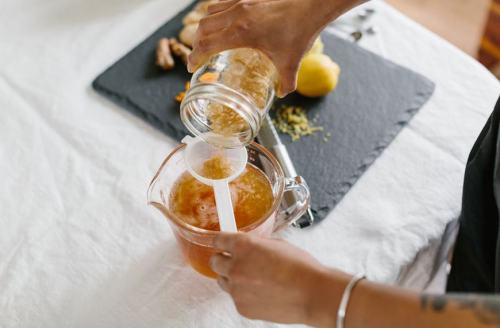
But both probiotic beverages have some excellent health benefits
There are a couple of different health benefits between kombucha and water kefir, too. Backing up Team Kombucha, “the tea is rich in phytochemicals that may help prevent cancer,” says Brissette.
But kefir has its merits, too. “Kefir contains a type of carbohydrate called kefiran that may act as a prebiotic, and prebiotics act as food for probotics so they can survive and thrive,” she says.
Ultimately, both fermented beverages help promote healthy gut bacteria. And that’s good news for keeping pathogens and “bad” bacteria at bay, which is majorly important for overall health. “The gut plays [a big role] in regulating anxiety and depression, promoting a proper immune system, decreasing the risk of type 2 diabetes, lowering the risk of obesity, improving brain health, and decreasing GI symptoms,” says Titgemeier.
Just like kombucha, though, water kefir isn’t for everyone. “If a person has a histamine intolerance or small intestinal bacterial overgrowth (SIBO), water kefir and other fermented foods may lead to uncomfortable symptoms such as nausea, bloating, rashes, asthma, allergies, [and more],” says Titgemeier.
Pregnant women should also steer clear of fermented beverages like water kefir, adds Brissette.
Here’s how to make water kefir at home
If you’re tempted to cheat on kombucha with water kefir (or just add it to your gut health arsenal), it’s pretty simple to make at home. Titgemeier likes this water kefir starter kit, or you can order water kefir grains online and go totally DIY. Here’s how to make it at home (and reuse your grains for a second batch), according to Brissette.
1. Pour 1/4 cup of sugar into a glass mason jar, then add 1/2 cup of hot water and swirl to dissolve the sugar.
2. Add three cups of room temperature water. Check to make sure the jar of sugar and water are room temperature now, about 68°F to 85°F.
3. Add the water kefir grains. Cover the jar and place it in a warm spot, 68° to 85°F, to culture for 24 to 48 hours.
4. Strain the kefir grains out of the finished water kefir. Your finished water kefir is now ready to drink or bottle.
5. To reuse your kefir grains, prepare a new batch of sugar water (steps one and two), then add the used grains to it to repeat steps three and four.
For a twist on the classic water kefir recipe, try making this coconut rose version at home. Or if you’re craving something warmer, take this quiz to find out your perfect healthy winter drink.
Sign Up for Our Daily Newsletter
Get all the latest in wellness, trends, food, fitness, beauty, and more delivered right to your inbox.
Got it, you've been added to our email list.
